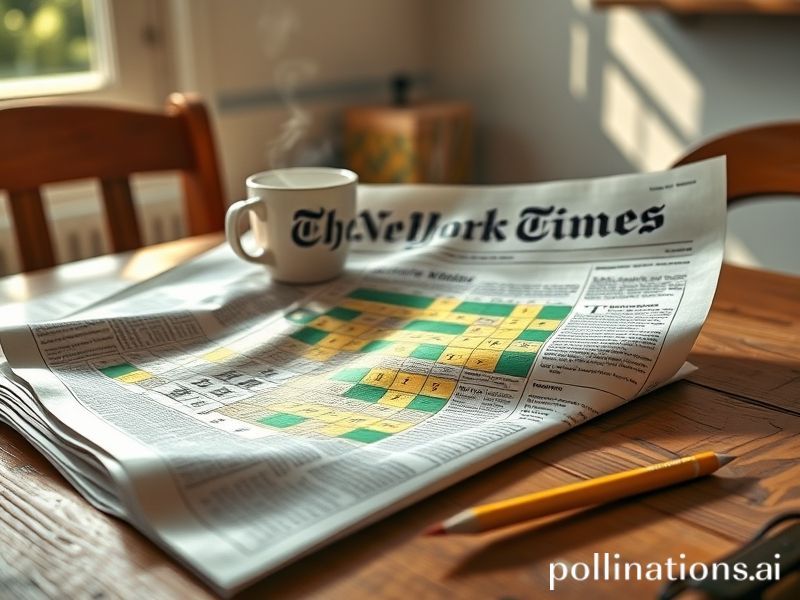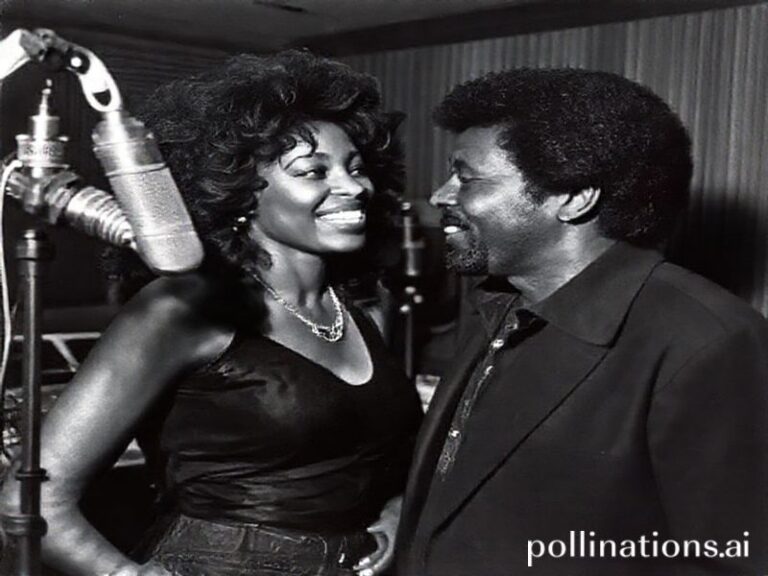One Tiny Green Grid to Rule Them All: How NYT Wordle Became the Planet’s Last Neutral Zone
The New York Times Wordle: A Tiny Green Grid Holding the World Together
By Our Correspondent, Somewhere Between Despair and Delight
PARIS—At 00:01 GMT, the Earth’s rotation briefly stutters. Somewhere in Lagos a nurse on night shift, a commodities trader in Singapore, and a Ukrainian artillery spotter near Bakhmut all thumb the same five empty squares. The squares fill, turn green, yellow, or the soul-crushing gray that recalls every missed deadline and romantic misstep. A digital bauble—The New York Times’ Wordle—has become the planet’s most democratic daily ritual, one vowel at a time.
From the outside, it’s preposterous. The United Nations can’t agree on the definition of “genocide,” but 3.2 million strangers will converge on Twitter within minutes to argue whether “CAULK” is a fair solution. (It is not.) The game costs nothing, demands thirty seconds, and yet has achieved what decades of UNESCO literacy campaigns only dreamed of: getting humans to spell correctly on purpose.
Global supply-chain managers report that Wordle completion time is now a leading indicator of workplace morale, second only to whether the coffee machine has beans. In Copenhagen, a fintech start-up tracks employee green-square streaks to predict quarterly churn. Meanwhile, the Kremlin allegedly monitors Russian-language Wordle clones to measure domestic discontent by counting how many players use “NYET” as their opener. (The FSB denies this, but then they also denied invading Crimea.)
Consider the geopolitics. The original list of 2,315 solutions is unapologetically Anglo-centric. “ZONAL” appears; “QANAT,” the Persian irrigation tunnel that keeps much of the Middle East alive, does not. Tehran’s state media calls this “digital colonialism.” Washington think-tanks host webinars on “Wordle Dependency” and fret that adversaries could weaponize obscure solutions—imagine the chaos if tomorrow’s word were “PUTIN.” The Pentagon, ever subtle, has commissioned a classified study titled “Stochastic Lexical Deterrence.” Your tax dollars, hard at play.
In refugee camps across northern Kenya, NGOs distribute solar chargers so teenagers can keep streaks alive between geography lessons. Aid workers whisper that the green tiles are the only reliable green anything in the forecast. One Congolese student told me Wordle feels like “a border you can cross without a passport.” Dark humor, but then the barbed wire is literal.
Back in the pampered West, the game has become a class signifier. Posting your score at midnight signals leisure; posting at 7:02 a.m. betrays a commuter’s grim routine. In London, estate agents brag about “walk-time to Wordle-friendly cafés,” though the Wi-Fi is always patchy and the croissants are laminated despair. Silicon Valley VCs now pitch “Wordle but for crypto,” which is like proposing marriage during a root canal.
There is, naturally, a backlash. France’s culture minister has proposed a quota requiring at least 30 percent of daily solutions to be French words nobody uses outside the Académie. Beijing’s censors briefly banned the game after too many citizens discovered the word “FREED” and filled Weibo with accidental manifestos. And on the night “MUMMY” was the solution, Egyptian Twitter politely lost its collective mind.
Yet the most telling detail hides in the data. Traffic plummeted the day Russia invaded Ukraine; hearts, evidently, were not in six-letter distractions. Then, within 48 hours, numbers surged past baseline—proof that even in apocalypse we crave micro-victories. A green square is a tiny banner that reads: “I still have control over something, if only orthography.”
The New York Times, for its part, has accidentally built the least lucrative empire since the League of Nations. The subscription bump was modest; the ad inventory is laughably small. Still, goodwill accumulates like compound interest. When civilization finally collapses and aliens sift through our ruins, they’ll find billions of identical grids etched into server racks and decide we were a species obsessed with orderly color patterns. They won’t be entirely wrong.
So tomorrow, when the clock ticks over and the planet exhales in unison, remember this: we may not agree on carbon budgets or vaccine patents, but for one fleeting minute we all know exactly how many vowels fit between consonants. If that isn’t unity, it’s at least a shared delusion—small, green, and mercifully finite.







